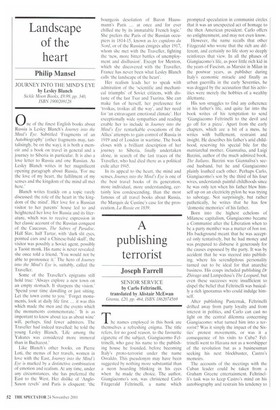Landscape of the heart
Philip Manse'
JOURNEY INTO THE MIND'S EYE by Lesley Blanch Sickle Moon Books, £9.99, pp. 340, ISBN 1900209128 One of the finest English hooks about Russia is Lesley Blanch's Journey into the Mind's Eye. Subtitled 'Fragments of an Autobiography' (other fragments may, tantalisingly, be on the way), it is both a memoir and a book on travel in general and a journey to Siberia in particular. It is also a love letter to Russia and one Russian. As Lesley Blanch writes in her magnificent opening paragraph about Russia, 'For me the love of my heart, the fulfilment of my senses and the kingdom of the mind all met here.'
Blanch writes frankly on a topic rarely discussed: the role of the heart in the kingdom of the mind'. Her love for a Russian visitor to her parents' house led to and heightened her love for Russia and its literature, which was to receive expression in her classic account of the Russian conquest of the Caucasus, The Sabres of Paradise. Half Slav, half Tartar, with 'dark slit eyes, pointed ears and a Chinese-bald skull', the visitor was possibly a Soviet agent, possibly a Taoist monk. His name is never revealed: she once told a friend, 'You would not be able to pronounce it.' The hero of Journey into the Mind's Eve is, suitably, called the Traveller.
Some of the Traveller's epigrams still hold true: 'Always explore a new town on an empty stomach. It sharpens the vision.' 'Spend your time dawdling or just sitting. Let the town come to you.' 'Forget monuments, look at daily life first ... it was this which made the men and the events which the monuments commemorate,' It is as important to know about tea as about wine' will, perhaps, find fewer admirers. The Traveller had indeed travelled: he told the young Lesley Blanch, 'Life among the Yakutes was considered more immoral than in Bucharest.'
Like Blanch's other books, on Pierre Loti, the menus of her travels, women in love with the East. Journey into the Mind's Eye is marked by a distinctive combination of emotion and realism. At any time, under any circumstances, she has preferred the East to the West. Her dislike of 'AngloSaxon revels' and Paris is eloquent: 'the bourgeois desolation of Baron Hauss mann's Paris at once and for ever chilled me by its immutable French logic.' She prefers the Paris of the Russian occupiers in 1814-15, known as les cupidons du Nord, or of the Russian émigrés after 1917, whom she met with the Traveller, fighting the 'new, more bitter battles of unemployment and disillusion'. Except for Menton, which she discovered with the Traveller, France has never been what Lesley Blanch calls 'the landscape of the heart'.
Her realism leads her to speak with admiration of the 'scientific and mechanical triumphs' of Soviet citizens, with distaste of the last Tsar and Tsarina. She can make fun of herself, her preference for 'troikas, troikas all the way', and her need for 'an extravagant emotional climate'. Her exceptionally wide sympathies and reading enable her to include in Journey into the Mind's Eye remarkable evocations of the Allies' attempts to gain control of Russia in 1919 and of London in wartime. The book closes with a brilliant description of her journey to Siberia, finally undertaken alone, in search of the last traces of the Traveller, who had died there as a political exile after 1945.
In its appeal to the heart, the mind and senses. Journey into the Mind's Eve is one of the best travel books of its generation, more individual, more understanding, certainly less condescending, than the most famous of all travel books about Russia, the Marquis de Custine's case for the prosecution, La Russie en 1839.


















































































 Previous page
Previous page